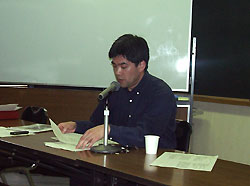Seminar Report: "Memory
of Development"
by Taisuke SHIME
Graduate School of Asian and African Area Studies (ASAFAS),
Kyoto University
 Date: March 6, 2003, 2:00-5:00 p.m.
Date: March 6, 2003, 2:00-5:00 p.m.
Venue: Room 207, 2nd Floor, East Wing
The Center for Southeast Asian Studies (CSEAS) Kyoto University
2:00-2:40 ADACHI Akira (ASAFAS)
"Problems with the Memory of Development"
2:40-3:20 KATO Tsuyoshi (ASAFAS)
"How Were Development and Revolution
Recounted? -An Indonesian Example"
3:40-4:20 UCHIYAMADA Yasushi (Tsukuba University)
"Development Has No Memory"
4:20-5:00 General Discussion
At the outset of the meeting, Dr. Akira Adachi, the organizer
of the study meeting, laid out the significance of research
on and the concept of development and memory. Although research
into various forms of "memory" became a fad beginning
in the 1980s, little discussion has been made on the subject
of the memory of development. This point, which was elaborated
in later reports, is inextricably linked to the characteristics
of development.
Dr. Adachi underscored the importance of making
a distinction between the "memory of development"
and "memory in development" in building arguments
on the subject. More specifically, he argued that a distinction
should be made between the "memory of the project cycle"
as a memory of the development planner and the "chain
of various events related to a development project,"
as a memory of those who accept a development plan. Further,
three specific target domains can be cited: "culture
and politics concerning a local development project and related
memory," "official memory and memory of individuals
concerning development" and "memory at development
aid organizations."
In the past, the experiences and memories of the "beneficiary"
of development have received little focus as an issue of memory.
Dr. Adachi concluded by saying that understanding and describing
such a memory would require refining the way the memory is
recounted, as a means of achieving solidarity with other "beneficiaries"
who also have memories of development, with due heed given
to the intricate network formed among the three target domains
and the politics of local culture.
 "How
Were Development and Revolution Recounted?" by Dr. Tsuyoshi
Kato shed light on the memory of development through a comparison
of keywords that dichotomized the contemporary history of
Indonesia. According to Dr. Kato, the contrast between development
and revolution can be summed up as follows. First of all,
revolution is deeply connected to mobilization, participation/sacrifice,
regime overthrow, memory and replay, while development is
closely related to elections, satisfaction/consumption, regime
maintenance, planning and renewal. Further, interestingly
enough, it is desirable for the existing regime to have revolution
remain a glorious past, while development is always oriented
toward an immediate future, until the next turning point comes.
Thus, development never looks back to the past. For development,
even the present time is a codename for the near future being
drawn to the present.
"How
Were Development and Revolution Recounted?" by Dr. Tsuyoshi
Kato shed light on the memory of development through a comparison
of keywords that dichotomized the contemporary history of
Indonesia. According to Dr. Kato, the contrast between development
and revolution can be summed up as follows. First of all,
revolution is deeply connected to mobilization, participation/sacrifice,
regime overthrow, memory and replay, while development is
closely related to elections, satisfaction/consumption, regime
maintenance, planning and renewal. Further, interestingly
enough, it is desirable for the existing regime to have revolution
remain a glorious past, while development is always oriented
toward an immediate future, until the next turning point comes.
Thus, development never looks back to the past. For development,
even the present time is a codename for the near future being
drawn to the present.
"Development Has No Memory" by Dr.
Yasushi Uchiyamada addressed two issues. First, there is a
solid schema in the field of development, and this schema
is constantly and continuously "transcribed." This
powerful schema can easily turn people into "development
specialists." Second, the core of the problem is from
where and how the process of the transcription should be described.
His way of raising the issues suggests that the process of
development has no memory, and that even if it had, this memory
would be just the memory of the form.
Issues discussed in the question-and-answer session
included: "The discussion always took place from the
standpoint of the development planner, and never addressed
the memory of the beneficiary," "Why do we need
to collect withering memories?"; and "How should
experiences be recounted?"
We believe this study meeting marked a first
step in opening a new chapter in research on development issues,
in that it has provided a first opportunity for discussions
on the issue of development and memory. We have to admit that
because the meeting was the first such attempt, there were
notable gaps in the recognition of issues involved between
the speakers and the audience, and as a result the discussions
sometimes went around in circles. As we hold many more sessions
like this, however, we expect to be able to deepen the understanding
of the issues of development and memory.

